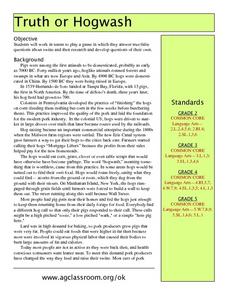Curated OER
Non-Random Variables: NBA Championship
Students demonstrate probability distribution of non-random variables. Students collect data on the NBA Championships. They record the data and compute subsets and permutations.
Curated OER
Lara's Equiprobable Dice
Students try some new exercises involving probability. These are, first of all, that the probability of getting a given total when two dice are rolled is equal to the number of possible ways of getting that total, divided by 36 (the...
Curated OER
A Statistical Study on the Letters of the Alphabet
Students see that there are mathematical rules that can affect our use of the English language. Calculate the probability of picking any letter at random from a piece of English literature.
Curated OER
Make the Highest Total
Sixth graders predict the outcome of a simple probability experiment, test it and explain the result by using problem solving strategies to explore situations mathematically. They then play a few games informally where students play in...
Curated OER
Transport (Speaking)
Students play a "Do You Have" game to practice transport vocabulary. In groups, they explore the eight methods of transport. They examine the following modes of transportation: car, bus, plane, boat, train, helicopter, and rocket. The...
Curated OER
Truth or Hogwash
Explore the history of domesticated pigs and their important byproducts. After discussing the use of pigs, class members create game boards describing the animals. While playing the game, they determine if the answers are true or...
Curated OER
The Basketball Tournament
Students estimate how many games are played if six teams play each other once. They investigate their own way and discuss possible strategies they might use. They then share their findings with the class.
Curated OER
Rolling Records
Fourth graders play a game to determine the likelihoods of different outcomes when rolling two number cubes. Students play a game to determine the likelihoods of different outcomes when rolling two number cubes.
Curated OER
CHAOS AND COMPUTERS
Learners discuss the Chaos Theory and how it came into existence.They observe order and compare it to the randomness of chaos. The lesson features the playing of a game to reinforce concepts.
Curated OER
Rhyme Charades
Young scholars participate in a game called "Rhyme Charades." The teacher thinks of a word to begin the charades game giving the clue "my word rhymes with ...". The students who have a guess stand in the middle of the circle and...
Curated OER
Rules of Sign Change
Students manipulate negative and positive numbers. In this integers lesson, students move through three activities exploring negative and positive whole numbers. A number line, cardboard function representation, and solving expressions...
Curated OER
Spark Activity: Basic Body Positions
Students practice basic body positions by moving to music using a locomotive skill called out by the teacher. Students move to a new spot when the music stops, and continue the game as new movements are called. Students discuss body...
Curated OER
Spinning Nickels
Students make predictions to figure out the probability of a spun nickel landing on either heads or tails. They test their predictions through experimentation. They create a graph showing the frequency for the number of heads.
Curated OER
Angles Lesson Plan
Learners stud angles, and then play the "What's Your Angle?" game. They complete at least 10 computer generated problems from the Angles Applet.
Curated OER
The Genetic Basis of Neurological Disorders
Young scholars describe some aspects of known genetic defects on the human neurological condition. They participate in a variety of exercises including drawings, games, and analogies.
Curated OER
Icky Sticky
First graders the /i/ sound by practicing the way the mouth moves while making the sound while saying "icky, sticky." They write the letter "i" using both upper and lower case letters, make words using letterboxes, and write about a...
Curated OER
Rethinking Perpetrators, Bystanders, and Rescuers: The Case of Max Schmeling
Pupils examine the life and actions of Max Schmeling during World War II. They read and analyze an article, compare/contrast Schmeling's choices with other people during this time period, and write a journal response.
Time Warp Trio
See You Later, Gladiator!
Young historians take a look at the age of gladiators, and the cultural atmosphere present when they staged their epic battles. Pupils pretend to be reporters and write newspaper articles about one of the events they stage. Then,...
Curated OER
The Father of Our Country
Explore United States history with this lesson on George Washington and the Revolutionary War. After reading biographical information about George Washington, learners make a list of ten reasons for the revolution. They create a timeline...
Visa
Allowances and Spending Plans
Help youngsters understand how to manage small amounts of money by discussing an allowance and the difference between spending, saving, and giving.
Curated OER
Cyber Chow Combos
Using a worksheet that's embedded in the plan, elementary schoolers must come up with the most possible combinations of food they can order from the menu on the worksheet. The lesson is meant to be done independently by everyone, then...
Curated OER
Build It With Lincoln Logs!
Students use primary sources to analyze advertisements, prices, and styles of Lincoln Logs from Carson Pirie Scott catalogs from 1952 to 1960. Students then compare modern-day toy to Lincoln Logs of the 1950s by analyzing differences in...
Curated OER
How does Physical activity Help You?
Examine factors that influence your choice about physical activity. In this physical activity lesson, students recognize how physical activity and good health go together. Students participate in a survey about physical activity and...
Other popular searches
- Probability Games With Dice
- Fun Math Probability Games
- Easy Probability Games
- Probability Games Multo]
- Probability Games Milt
- Math Probability Games
- Probability Games Multo
- Christmas Probability Games
- Probability Games Milt]
- Probability Games Mult
- Probability Games of Chance
- Probability Games With Coins

























